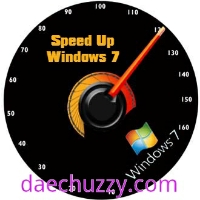Have you ever wondered why when you first buy a computer, it's speed is very fast, snappy and responsive? Always doing your bidding with little or no lag at all. Well, as we all know, over time the story changes and you beginto ask yourself, "what's all this?", "why is this computer getting unnecessarily slow?" There are a couple of reasons though, why computers get slow.
Truth is sometimes, we forget that the more softwares we install on our computers, the slower our computer becomes. This is because every software installed has it's own demand on your computer's memory.
Now, let's assume each software is a block of concrete, and the computer (with it's available memory space) is a skateboard. If we set this skateboard into motion, and decide to load concrete blocks on the skateboard; with time, the skateboard slows down until it comes to a halt as a result of the weight acting on it! Hope you get my drift?
Also, apart from the fact that your computer slows down over time, you also notice that as time goes on it takes a longer time to boot. Well, this can be attributed to the increasing number of start-up programs (programs that start automatically as you boot your computer).
Also, junk and temporary "temp" files are accumulated over time which also slow down computer speed!
Now we've seen some reasons why a computer slows down over time, let's look at simple maintenance tasks that can speed up your computer dramatically.
⇨Turn Off And Stop All Fancy Desktop Features/Programs
A number of desktop beautification programs are nice and very fanciful to behold. But as much as these features make your desktop fanciful, they also slow down your computer and program response time. Get rid of them to increase your computer's speed!
⇨ Defragment Your Drives Regularly.
Defragging is a simple process which takes place when file fragments (which is the way in which Windows arranges files) are put together to speed up file access. These file fragments are put together and quality defragmentation utilities (which are built in Windows) also assemble the free space into a single block to prevent future fragmentation.
So with regular use, your files are arranged 'haphazardly' in little bits and pieces. That's why you should defragment your hard drive on a regular basis. This includes all your computer hard drives-as many partitions as there are-no partition should be exempted.
This is a very simple maintenance task to run. Good thing is you can also schedule defragmentation hence automating the task of increasing your computer speed!
⇨ Shutdown Regularly!
Forgetting to shutdown is a very common practice amongst avid computer/laptop users.
Maybe because rebooting can be a pain, or because you want your computer to be always ready-to-go, or because you want your computer to work while you sleep, or probably because you run a server on your computer! But shutting down regularly increases your computer speed. How? When you don't shutdown, temp files accumulate on your computer, this slows down the computer's performance overtime! However, shutting down helps to take care of the issues that come up as a result of temp file accumulation!
⇨ Disable Desktop Shortcuts.
Desktop shortcuts are totally unnecessary, they not only occupy space on your desktop but also are an inefficient way to open files and programs on your desktop. Apart from reducing your computer speed, they also slow down your computer boot time! Better ways to open files would be to use Startup Menu, Quick Launch Menu etc. Doing this little thing also speed up your computer quite significantly.
⇨ Uninstall Programs That Are No Longer Useful.
Like I mentioned earlier, every program you install in your computer occupies some memory space. Now, if you continually install programs on your computer without removing them, you reduce the available memory on there, hence slowing down your computer. To make your computer faster, take your time to browse through your installed programs and uninstall the ones you no longer have need of.
⇨ Reduce The Number Of Startup Programs.
What do I mean by startup programs? These are programs that start as soon as you power on your computer. Many programs assign themselves (as a result of the way they were written) to start on boot; and removing as many of these programs as possible would help increase your computer speed as well as no boot time.
⇨ Close All Unused Programs.
This is another factor many computer owners ignore. Imagine running many programs at the same time! While it's not impossible to do that (all thanks to multitasking), you would be putting too much strain on the computers processing power and thus speed. Closing programs that are not currently being used would go a long way to speed up your computer.
⇨ Increase Your RAM Size.
All the factors I have mentioned before now deal with software. Increasing your RAM size is however an hardware task. To be completely honest with you the above tips would NOT work if you have a low RAM size! Imagine using a 512MB RAM and expecting your computer to be speedy; it doesn't work that way. So you might try heading up to your computer technician's and asking for a RAM increase. It would also increase your computer speed dramatically!
Well, now it's up to you to take action! And if you have other tips, kindly mention them in the comment box below, I and other readers would be glad you did!


Post a Comment
Post a Comment